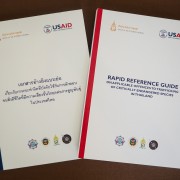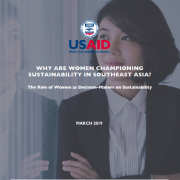Speeches Shim
The U.S. Agency for International Development Lower Mekong Initiative Connecting the Mekong through Education and Training (USAID-LMI COMET) project is a five-year (2014-2019) workforce development program that equips youth with market-driven skills, connects key stakeholders in education, business and government, and increases technology-based learning in classrooms.
The Women’s Livelihood Bond will provide more than 385,000 Southeast Asian women with access to credit, enhanced linkages to supply chains, and affordable goods and services to improve their livelihoods. The $8-million bond will benefit women in Cambodia, Vietnam and the Philippines. The U.S. Agency for International Development (USAID), in partnership with Australia’s Department of Foreign Affairs and Trade (DFAT), is guaranteeing 50 percent of the loan portfolio’s principal. The bond, structured and managed by Impact Investment Exchange (IIX), is one of the world's first social sustainability bonds with a focus on both social and financial returns.

In March 2019, Thailand’s Office of the Attorney General and the U.S. Agency for International Development (USAID) launched the Rapid Reference Guide on Applicable Offences to Trafficking of Critically Endangered Species in Thailand, a tool to help investigators and prosecutors navigate existing legislation to more effectively build strong cases resulting in successful prosecution of wildlife criminals.

Tainted food, plastic pollution, global warming and climate change – these are a number of the top concerns women have as consumers and investors, according to a study released by the USAID Green Invest Asia project and Moxie Future on women’s preferences and behaviors toward sustainable investment and business – a growing, multi-trillion dollar marketplace.

As a lab technician and now a leader in public health, Kanyarat Lausatianragit works on the frontlines. Much of her work is in the field, especially along the Thailand and Cambodia border. From her base in Sisaket’s Mueng District, she leads teams of approximately 10 people, traveling long distances by car and boat to reach communities in need and to provide services at mobile clinics. The people she helps, who live up to a 12 hours’ drive from Bangkok, are rubber plantations workers, soldiers at the army camps, and village farmers, woodcutters and others. This area features large rubber plantations, and migrant workers crossing over the border and back are exposed to tropical rainforests as well as malaria. Patrolling border police are at greatest risk of infection.

Comment
Make a general inquiry or suggest an improvement.